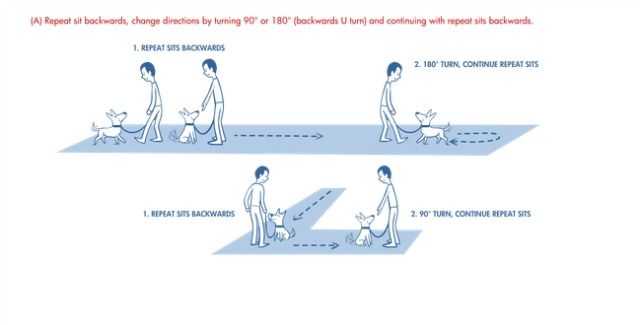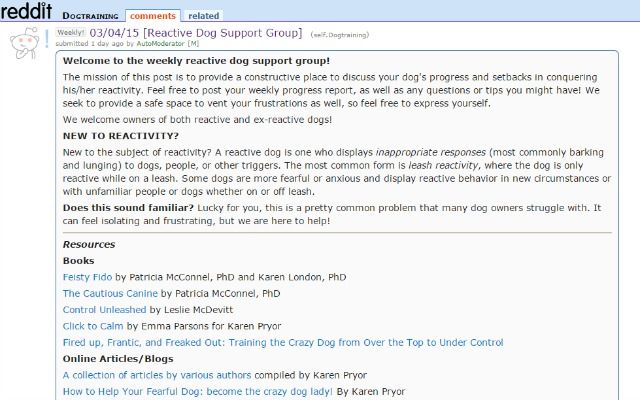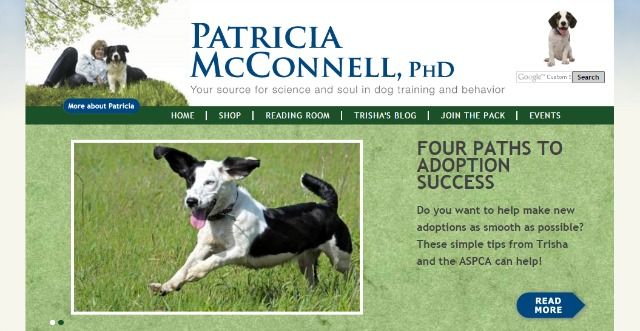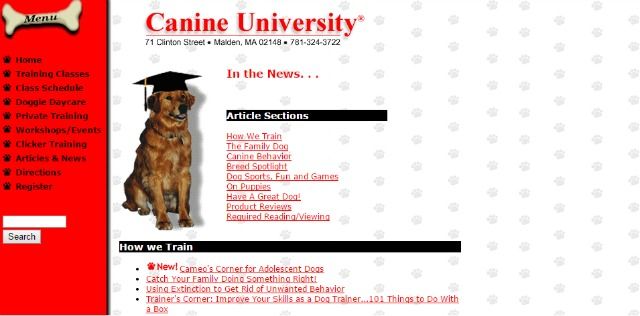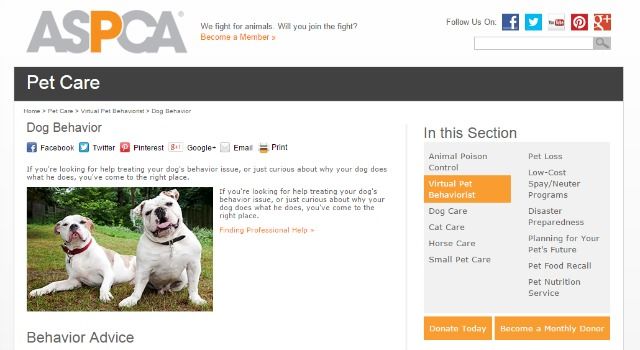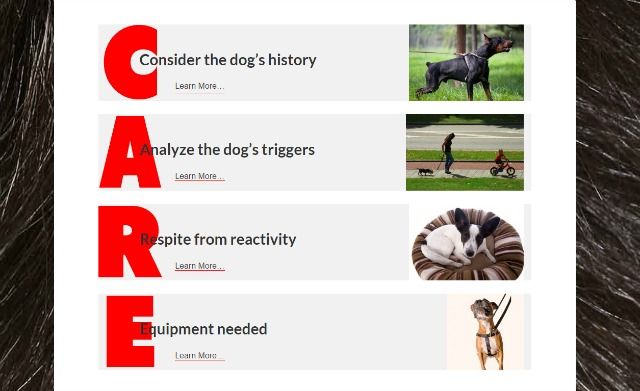I have a reactive dog.
If you don't have a reactive dog, you may underestimate the sadness and heartache that can afflict pet owners who do. Owning a reactive dog is difficult because their triggers often set them into a frenzy of barking or lunging or some other excessive reaction.
You get lots of disapproving stares and glares when your dog acts out, and people even give your dog that look -- the one that says 'that thing is a menace to society.'
For a while, I didn't know what to make of my dog's reactivity. I've felt helpless, anxious, depressed, angry and even betrayed by my dog's behavior. Finding some valuable online resources and support networks helped me learn about reactive dogs and how common a problem it is. I've been able to accept and manage my dog's reactivity.
Below are a few websites that address canine reactivity. These websites make both of your lives easier with information about reactivity management or training, or just as a support group to let you know "Hey, we've all been there, too."
Note: I am not a professional dog trainer and, as much as I like these websites, the best and most reliable way to get help for your reactive dog is to pay for professional help from a dog trainer or dog behaviorist.
Dr. Sophia Yin (Free, Extra Paid Course $40)
Perfect for dog parents (and cat parents) who need quick tips and techniques, Dr. Sophia Yin's website features detailed articles outlining behavior exercises for reactive dogs. Dr. Yin's site also reviews other common issues, such as separation anxiety and leash training, which can often be tied to reactivity problems.
Additionally, this website offers an online course designed to tackle many reactive dog owners' questions and concerns. At $40, Yin's "Skills for Handling Your Reactive or Hyperactive Dog Part 1" course (No Part 2 yet) reviews impulse control management, and gives delivery tips and advice on how to break complex exercises into simple steps.
Whether or not you take the paid course, you have access to articles discussing animal ownership, training techniques and general wellness at no cost.
r/dogtraining (Free)
One of the best forums for connecting with other dog owners, Reddit's dog training subsection features an ongoing question-and-answer platform where users can exchange knowledge and experiences.
Readers can participate in the Reactive Dog Support Group that takes place every Wednesday. Reactive dog owners come together to share their achievements, setbacks and comments about living with their reactive dogs.
The social aspect of this subreddit sets it apart from similar forums and sites. Topics explored include leash management for reactive dogs, coping with owner-to-owner animosity and potential underlying causes of reactive behavior, particularly in rescue pets.
As an added bonus, the support group also makes it easy to access extra training tools and resources for managing and training your reactive dog.
The Other End of the Leash (Free)
This blog of animal behaviorist Patricia McConnell explores all dog-related issues but focuses specifically on behavior concerns. A free resource, this site is a repository of training and behavior information backed by simple techniques.
Particularly helpful for reactive dog owners are the site's case study articles, the Dog-Dog Reactivity article and "How to stop an approaching dog in an emergency."
The blog offers article categories in Dog Behavior, Canine Cognition and Shelters and Rescues. Patricia also provides links to relevant ASPCA articles that many reactive dog owners will find useful.
Canine University (Free)
Canine University features in-depth articles on topics ranging from grooming and behavior to socialization and breed differences.
Particularly useful for reactive dog owners is Canine University's article, "So Your Dog is Reactive!" This article provided me with some good training tips and advice about how to create a good shaping plan for my dog.
I've also taught my dog the targeting behavior recommended in the article (her command is "Bump it!") and it has helped put her at ease around new objects and people.
ASPCA's Virtual Pet Behaviorist (Free)
This section of the ASPCA's website is dedicated to answering tough questions about animal behavior, exercises, training, and nutrition.
Unlike other websites, Virtual Pet Behaviorist was developed based on actual user questions about complex dog-ownership issues. The site has great articles about dealing with separation anxiety in your dog, food guarding and begging issues, digging and chewing, barking and jumping problems. It also has a ton of advice about dog training, leash walking, exercise tips, and proper care and grooming.
In short, this resource offers a ton of advice that any pet owner, but especially reactive dog owners, will appreciate.
CARE for Reactive Dogs (Free)
CARE for Reactive Dogs provides a blueprint for conditioning your dog against his or her reactivity. Using a three-step method, the site provides guided instructions on how to identify your dog's triggers, manage them and conditions your dog against them.
To follow the protocol of the site, start with PrepCare, then move on to TheCAREprotocol, then FollowupCARE.
One of the most helpful posts on the site is this one, which pre-emptively focuses on common training mistakes many people make.
The Most Important Things I've Learned
As the owner of a reactive dog, one of the most valuable things I've learned is that I need to be my dog's advocate.
She can't tell people "Hey, I don't want to be around you right now because I'm scared." That's my job. I have to know her well enough to be able to tell when she's uncomfortable and to know when I need to remove her from a situation before she has an excessive reaction.
I've familiarized myself with dog body language, calming signals and how dogs interpret human body language. I can better understand how my dog is feeling and get her out of a situation that's making her uncomfortable before it's too late (i.e. before she has a stressful reaction).
Here are a few more helpful things I've learned that I want to share with you:
Don't shout at your dog. Aside from making you feel animosity toward your dog, this is bad because your dog may think that you're barking along with him/her, which won't help your cause.
Don't coddle your dog. The baby voice and "Aw, it's okay!" when a trigger shows up can reinforce your dog's fear and reactivity. Instead, use a firm, commanding voice and say something like "It's fine." The fact that you don't seem to care can help your dog not care as much, too. (If you want to coddle and snuggle with your dog at other times, that's fine!)
Minimize your dog's exposure to triggers. The more your dog practices a reactive behavior, the easier it becomes. Keep your dog away from triggers (this can call for a lot of creativity) and very gradually train your dog to be okay around them, if you can.
Know that your dog isn't the only one. I had a difficult time understanding and coping with my dog's reactivity. I still have a hard time with it some days. But I've learned that it affects more pet owners than I was aware of. Since then, I've read some great reactivity articles that have helped me feel supported and hopeful. Check out this one from Bull in the City.
Remember, seeking professional help from a trainer is ideal for getting the best advice and training for your dog.
The resources above can help you get started, but take the time to consult a local dog trainer about further steps you can take, and make sure that whatever trainer you choose uses force-free methods.
When you can better understand and manage your dog's reactivity, you'll feel better and your dog will have a better, less-stressful life.
Want some more dog help? Check out these great dog training apps for Android and iOS.
Image Credit: SplitShire via Pixabay


